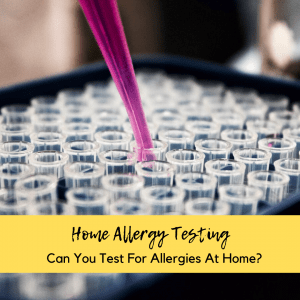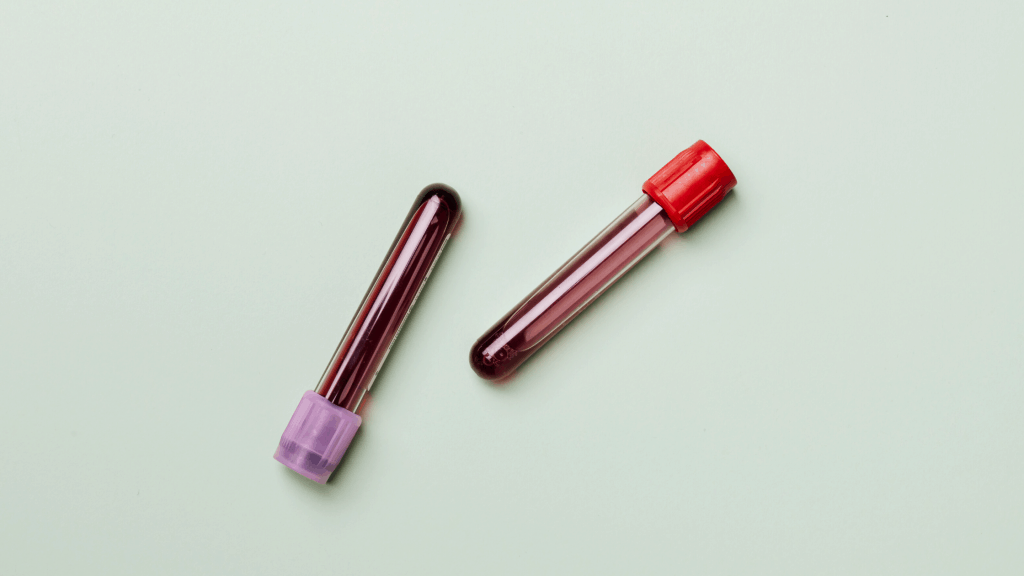A quick online search for 'home allergy test' gives a whopping 113 million results! At a time when we are encouraged to stay at home this may be a tempting option to try and get a quick answer, if you suspect you have allergies. But can you really test for allergies at home? Do allergy tests work for all types of allergies - food, animal, environmental? And do they work for everyone? In this blog post I'll take a look at the pros and cons of allergy testing and tell you what to look out for when choosing a home allergy test - as well as what to avoid.
ADVERTISING FEATURE – This post contains a sponsored link. However all thoughts and opinions are my own.

Why Test for Allergies?
If you eat a slice of grandma's coffee and walnut cake and come out in hives, or get sneezy after visiting your friend with cats, it can be pretty straightforward to work out what is causing your allergic reaction. But it's not always clear cut. Some people experience mild symptoms that come and go pretty much all of the time. Or they just feel 'not quite right' and want to know if it could be an allergy that is making them feel a bit off. In this situation it can be hard work to get to the bottom of exactly what is causing your symptoms. It's understandable to want to take an allergy test that gives you a quick, cut-and-dried answer to your question.

Unfortunately, allergy testing isn't as simple as it might seem. There are several different types of allergy tests, and all have differing levels of accuracy and reliability. For the tests that are generally accepted as scientifically valid, they only work for certain types of allergic reaction. And even with a test, you still need a doctor's advice to interpret the results correctly. So now, let's look at each of these issues in a bit more detail.
Types of Allergy Test
Let's start by going over the types of test to avoid. They are commonly used by alternative health practitioners, who claim to find them useful. However, when studied scientifically, these so-called 'allergy tests' have been shown to be about as accurate as guessing. Some of them tend to give you a long list of things you are 'allergic' to, which can lead to you avoiding more foods (and other allergy triggers) than you actually need to! Not only is this inconvenient and difficult to stick to, it could even cause nutritional deficiencies. NICE guidelines for allergy testing warn against using these alternative tests, and say they are 'a waste of time and money':
Applied Kinesiology
This claims to detect allergies based on muscle weakness in response to different foods. Over at Bridges and Balloons you can read a blog post reviewing her experiences of visiting two different practitioners offering applied kinesiology allergy tests. (Not strictly a home allergy test, of course)
Hair Analysis
This tests a sample of your hair to see if you have any allergies. This is sometimes on offer in Chinese health food shops, or available by post. However, there are no known markers of food allergy found in human hair.
IgG Blood Tests
Often advertised online as 'Food Intolerance Testing'. These sound more convincing - they are a blood test after all! And it's a super convenient home allergy test kit you can easily order online. You send a sample of blood to a lab, which tests for IgG antibodies for specific foods.
However, there is no evidence to actually link IgG antibodies to food allergies or intolerances! So having a high level of IgG antibodies to a particular allergen does not mean you are sensitive to that allergen. In fact it might be quite the opposite - the American Academy of Allergy, Asthma and Immunology reports that having IgG antibodies may actually be a sign of tolerance to that food!

Vega Test
This test uses a machine to detect changes in your electromagnetic 'energy levels' in response to different foods, additives, or environmental allergens. A BBC documentary tried out Vega testing and the same person got different results depending on which shop they visited! Again, this is not strictly speaking a home allergy test, but one that you might consider paying for if you are wondering about allergies.
Personally, I try to keep an open mind about alternative health and natural remedies, because modern science is not flawless. We have taken advice from an alternative practitioner to help with my daughter's eczema and had great results. I am not anti- natural health! But on allergy testing, the evidence seems pretty clear. So what types of allergy test do actually work?
IgE vs Non-IgE Allergies
Before we continue, there's something important we need to consider: what type of allergy do you have? This is not a question of what you are allergic to, but how your body reacts.
IgE-Mediated Allergy
The most well-known type of allergy is called an IgE-mediated allergy. These show up as an immediate reaction (within 2 hours of eating the food), with symptoms such as vomiting and diarrhoea, hives, swelling, wheezing or coughing. The most severe of these reactions is anaphylaxis, which involves multiple organs in the body and can be life-threatening. They involve the body's immune system reacting to something harmless by producing IgE antibodies and other substances.
Non-IgE Mediated Allergy
However, some reactions are more delayed, and may appear 2 hours or as much as 3 days after eating the food. These are called non-IgE mediated allergies. These also involve the immune system, but without any IgE antibodies. The reaction often starts in the gut, and may include symptoms like vomiting and diarrhoea as well as abdominal pains. It can also lead to skin symptoms like itching, rashes or even eczema.
Intolerances
Then, we also have food intolerances to consider. These are not allergies, as they do not involve the immune system. Someone with a food intolerance might have symptoms like bloating or an upset stomach a few hours after eating the food. It is still unpleasant of course, and not fun for anyone, but it's not classed as an allergy.

So how does this affect allergy testing? Well, allergy testing only works for IgE-mediated reactions - those are the immedate reactions. Sorry to those of you with delayed reactions (non-IgE) - we don't have any tests for you yet! You'll have to stick to keeping a food diary and trialling an exclusion diet - with support from your doctor of course. There are some scientifically approved tests for some food intolerances, such as hydrogen breath tests, but that's a whole other blog post!
So if you have an immediate type allergic reaction, these are the tests that work for you:
Testing for IgE-Mediated Allergies
Skin Prick Tests
During a skin prick test, a nurse will place a number of droplets containing potential allergens on the skin, and gently prick the skin under the drop with a needle. Then, you wait and see if your skin reacts to the allergen. A doctor will help to interpret the results (the size of the bump matters!) This type of test is safe for most people, if a little uncomfortable. However, this test is only available in an allergy clinic or hospital setting, and can not be done at home.

IgE Blood Tests
This test checks a sample of your blood to see if it contains specific IgE antibodies for particular allergens. The more IgE antibodies you have for a particular allergen, the more likely you are to have an allergic reaction to it. Yes, I did say 'more likely' - it's not a 100% guarantee! Some people can have high IgE antibodies for a particular allergen, but never react to it. There is also a small chance that the test can give a 'false negative' - showing no IgE antibodies for something that a person does react to. A doctor can help you interpret your results, and you will also need to consider your symptoms and medical history.
A single allergy blood test can test for hundreds of allergens at once, including:
- food
- pollen
- animals
- insect stings
- moulds & yeasts
- mites (including dust mites)
The benefits of doing an IgE allergy blood test at home are, firstly, that it is very safe. There is absolutely no chance of a reaction as you don't have to go anywhere near any allergens. Secondly, it can help you to make a shortlist of suspected allergens that could be causing your reactions. And thirdly, it can help you to prepare for an appointment with your doctor to discuss your allergies. You can even discuss the results over the phone, which is very handy at a time when face-to-face doctor's appointments are becoming much less common.
Just bear in mind that no allergy test will give you a clear yes/no answer, and you should always discuss your test results with a doctor. If you suspect you may have an allergy to something, always seek advice from a medical professional.
Have you ever had allergy testing? How did you find it? Was it helpful?


Herpezine
While it is possible, accessible, and very doable, it is still really not adviseable to self diagnoze even if it's just to test out if you have these allergies or not. Seeking the help of a healthcare professional is always advised and required. Not just for it to be done properly but also to be documented legally.
Zoe
Absolutely - if you have access to healthcare near you, definitely seek advice from a professional. A home test might be handy if you need to access healthcare remotely and can't get to a clinic for any reason, or if your GP is reluctant to refer you to a specialist.
Claire Masters
I didn't realize that allergy testing can be done by analyzing a blood sample and finding IgE antibodies for a specific allergen. It's also amazing how one test can determine most if not all of your allergies. I understand how some reactions can be life-threatening so it's important to have yourself tested. https://www.allanforrest.com.au/hearing-and-allergy-testing
Zainaba Salim
Great post! I love how you explained the different types of allergies and tests so clearly. I recently had an allergy test, and it was a fantastic experience! The process was easy and informative. If you're in Dubai and thinking about getting an allergy test, I highly recommend checking out this link: http://www.fml-dubai.com/allergy-test/. It's a reliable option for addressing allergy concerns!